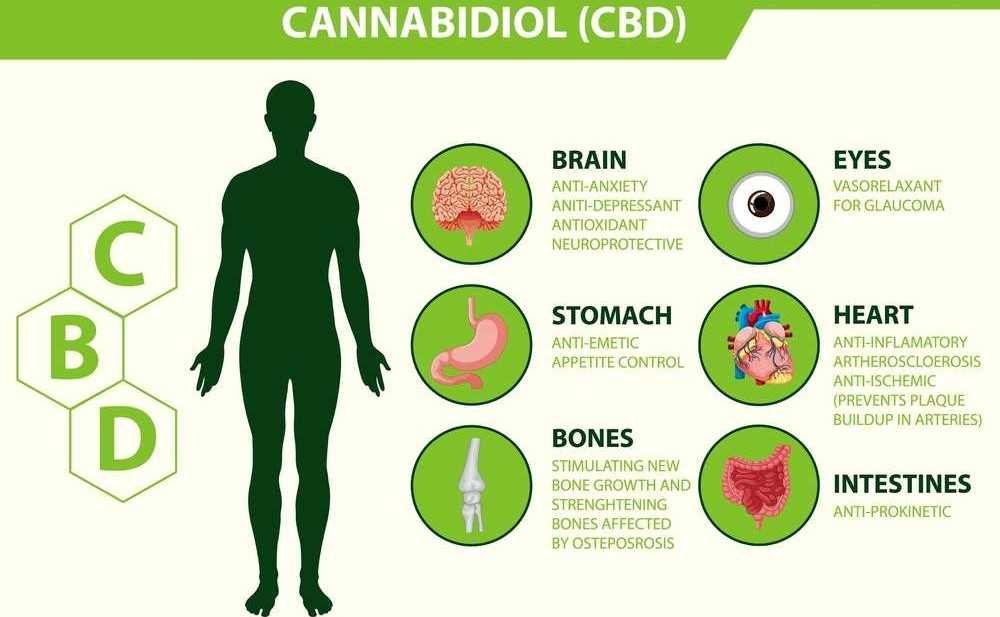After the Farm Bill legalized hemp-derived CBD in the US, it has become a household item with its therapeutic and wellness benefits and diverse application options. However, a common question remains at the forefront of many people’s minds: is CBD safe?
In this article, we will shed light on the safety of hemp-derived CBD, exploring the latest research findings, potential side effects, and regulatory considerations, and we’ll also look at the overall safety of CBD products available in the market.
Understanding hemp-derived CBD
CBD, or “cannabidiol” is one of over a hundred cannabinoids found in the hemp plant. Unlike its counterpart, THC (tetrahydrocannabinol), CBD does not produce a “high” effect. Instead, it interacts with the endocannabinoid system (ECS) in the body and helps it reach a state of homeostasis.
This interaction of CBD with the ECS results in a wide range of benefits, some of which are; relief from pain and inflammation, stress and anxiety relief, and better mood and sleep.
Is hemp-derived CBD safe?
According to WHO (World Health Organization), CBD in its pure form does not have any potential for abuse, nor does it cause any harm. So it is considered safe when used responsibly and by established guidelines.
Lets take a deeper look at CBD’s safety aspect:
Research on CBD’s safety:
Scientific research on CBD is ongoing, the existing studies suggest a favorable safety profile in humans, and as compared with other drugs CBD also has a better side effect profile (1).
However, more research is needed to fully understand the long-term safety aspects of CBD use.
Possible side effects:
While CBD is generally well-tolerated, some people can experience mild side effects, including dry mouth, drowsiness, digestive issues, and changes in appetite.
However, it’s important to note that these side effects typically happen when you use poor-quality CBD products or use them at an inappropriate dosage.
Otherwise, the side effects are typically mild and pass once your body adjusts to CBD.
Drug interactions:
CBD can interact with certain medications, particularly those metabolized by the liver. This interaction can affect the metabolism of other medications, potentially leading to adverse or diminished effects.
If you are taking any medications, you should consult with your healthcare provider before introducing CBD into your daily routine.
Legal distinction:
Hemp-derived CBD products are legal in the US, only when they do not contain more than 0.3% of THC. However, due to limited regulation and over-saturation of the CBD marketplace, there are many mislabeled products available that can contain over 0.3% THC, which makes them illegal.
It is recommended that you only purchase CBD products from recognized brands that conduct third-party lab tests and provide an updated COA (certificate of analysis) that authenticates the legal limits of THC.
Individual sensitivity:
CBD works differently for everyone and its effects vary based on factors such as types of CBD product, your body weight, metabolism, and overall health.
For many people, CBD works effectively between 10 to 50 mg a day, while some can require up to 600 mg of CBD per day to feel any effects.
However, for certain individuals, CBD might not do anything, no matter how much they take or which CBD product they use. There could be many reasons for this, but this essentially means CBD is not for everyone.
Are CBD products available in the market safe?
Unlike the FDA-approved CBD drug product; Epidiolex, most CBD products available in the market are not evaluated by the FDA (Food and Drug Association). So there are a lot of mislabeled CBD products circulating in the market that are far from safe.
However, there are certain steps you can take to ensure the safety of a CBD product, such as:
Look for third-party testing and COA (certificate of analysis)
Look for products that have undergone third-party testing. This means an independent laboratory has verified the product’s content, ensuring it meets quality and safety standards.
While many CBD brands also provide COA on their websites or upon request. These certificates offer detailed information about the product’s composition and testing results.
Check product reviews and reputation of a brand
Research customer reviews and the reputation of a CBD brand before shopping. Positive reviews and a good reputation indicate that others have had a satisfactory experience with the product. Look for feedback on product effectiveness, safety, and the company’s customer service.
Essentially, a CBD brand that uses high-quality hemp and employs Good Manufacturing Practices (GMP) is an additional assurance of CBD product quality and safety.
Avoid products with unrealistic health claims
Be cautious of products making health claims. While CBD shows promise in various areas, it is not a sure solution. Trust CBD products that provide realistic and evidence-based information about their potential effects.
Transparent and honest communication from CBD brands contributes to a credible and safe marketplace.
Final thoughts
In conclusion, hemp-derived CBD is safe for most people when used responsibly and in appropriate doses.
As the scientific community continues to explore the potential of CBD, a balanced approach that considers both the benefits and potential risks is essential for a safe experience.
Disclosure:
The information provided in this article is meant for general use only and may not always suit everyone’s individual needs. Your health and wellness are personal, so you should consult a medical professional for personalized advice before making any decisions based on our content.
We value the editorial integrity of all our articles and try to ensure that what we publish is reliable and up-to-date to the best of our knowledge. For more information, please read our Disclosure Policy.

